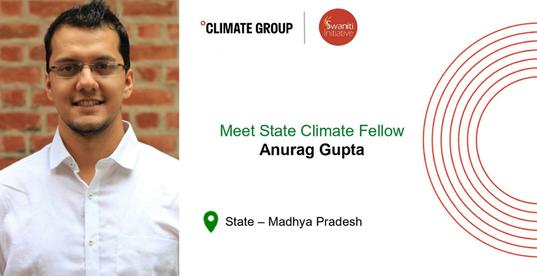The State Climate Fellows initiative in India supports subnational climate action. In this interview, Anurag Gupta speaks about climate action in Madhya Pradesh.
What are the most exciting aspects of work you are involved with as a State Climate Fellow in Madhya Pradesh?
I am responsible for providing technical and project management support to senior government officials of Madhya Pradesh in implementing solar rooftop projects across the Indian state. I am specifically working on 5 major initiatives — Solar Rooftop Initiative at State Technical Institutions (SRISTI), Sun for Rural Jan (SURAJ), Sun’s Blessings and Health (SuBaH), Footwear Design and Development Institute of India (FDDI) and National Power Training Institute (NPTI).
The most exciting aspects of the Fellowship for me are the opportunity to develop these initiatives, and to coordinate with several government departments, technical institutions, project implementation agencies and other stakeholders.
To develop these initiatives, I have created big data sets of technical information and analysed them to showcase their environmental and economic benefits. Additionally, I am also involved in developing innovative tools and mechanisms, working on proposals and power purchase agreements (PPAs) for the projects.
What unique opportunities does Madhya Pradesh present in terms of climate action work? What are your biggest challenges?
The state has observed tremendous socio-economic development over a decade and with a growing population, the need for consistent energy, better physical infrastructure, a robust public transportation system and climate resilient systems is ever increasing.
There has been a significant rise in energy demand across various sectors in the state, which has become a major challenge for the state authorities. To address this challenge, the state government is implementing various renewable energy projects, mainly solar and wind energy projects. The state has set an ambitious target of installing 2.2 GW of solar projects by 2030 and developing various solar cities and India’s first floating solar projects.
To reduce its overall GHG emission, the state government has also been implementing the SRISTI initiative where solar rooftop projects will be installed at around 280 technical education institutions across the state.
As a young professional, how has your experience been working on climate action at the subnational level?
I have spent more than a year in this Fellowship, and it has been a great experience working with the state government. I am grateful to have had the opportunity to work directly with senior policymakers. I have got the chance to learn how the government machinery works, initiatives are envisaged, developed, and implemented, and challenges of working with various stakeholders. I have also learnt big data analysis, renewable electricity (RE) regulation analysis, data management as well.
How do you think your fellowship is contributing towards Madhya Pradesh’s subnational climate action goals?
The Fellowship is contributing towards implementation of various RE projects in the state as mentioned above. I am providing technical and project management support which is helping the state’s technical education department in implementing the SRISTI initiative and SURAJ [for the installation of solar rooftop in cooperation with India’s Ministry of Panchayati Raj].
In addition, I have helped showcase environmental and economic benefits of previous as well as upcoming solar rooftop projects which have garnered interest from various other states, ministries, and institutions across the country.
I have spent more than a year in this Fellowship, and it has been a great experience working with the state government. I am grateful to have had the opportunity to learn how the government machinery works, initiatives are envisaged, developed and implemented, and challenges of working with various stakeholders.
-Anurag Gupta
I have spent more than a year in this Fellowship, and it has been a great experience working with the state government. I am grateful to have had the opportunity to learn how the government machinery works, initiatives are envisaged, developed and implemented, and challenges of working with various stakeholders.
-Anurag Gupta
